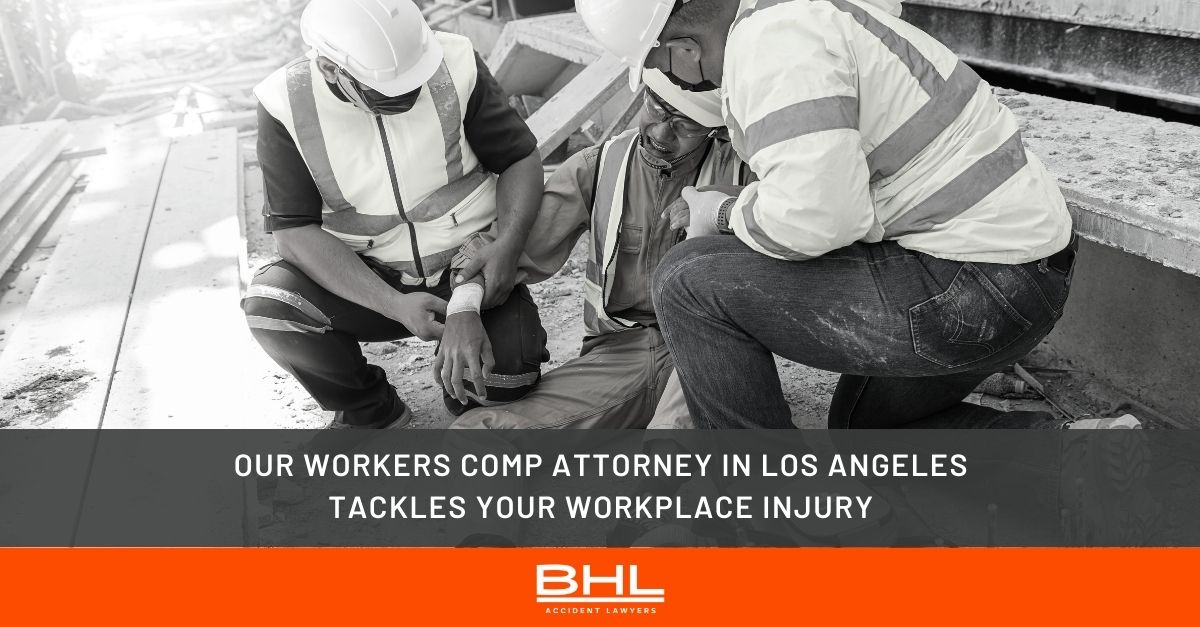For the most part, no. In California, if you’re hurt at work, your employers are mostly, more or less, protected from liability. But, if they did something to injure you intentionally, or did something they knew would injure you, then you may have a case.

Alternatively, you may be able to sue a third party in addition to your employer, should they have been responsible for your injury. For example, if you work at a construction site and you’re injured by a defective piece of machinery, then you may be able to sue the manufacturer, the designer, and so forth.
This is all the more reason to speak to an experienced workers compensation attorney as soon as possible after your injury. To schedule a consultation with workers comp lawyer Belal Hamideh, you can message him through this site or call.
How a Workers’ Compensation Attorney Can Help
Having a seasoned personal injury attorney from California at your service could significantly elevate your chances. Such a professional is well-versed with the nuances of the court system, the legal framework, and particularly the personal injury laws.
A seasoned attorney can guide you accurately on the worth of your claim, helping you claim all potential damages – punitive, economic, emotional loss-related, among others. Moreover, an attorney will also save you precious time, allowing you more room to concentrate on your recovery.

What Types of Cases Does a Personal Injury Attorney Deal With?
California personal injury attorneys typically deal with a broad spectrum of vehicular accident cases including:
Motor Vehicle Accidents
Drivers are obliged to practice a “duty of care” while on the road. If they violate this duty due to reckless or negligent behavior resulting in your injury, you are entitled to compensation.
Pedestrian Accidents
You have a right to compensation if someone flouts the traffic rules and ends up hitting you with their vehicle.
Bicycle Accidents
Bicyclists have much lower protection than vehicles. If you get hit and injured, you likely have a case.
Motorcycle Accidents
Mostly, in a motorcycle-vehicle crash, the motorcyclist is not at fault. We have years of experience in effectively dealing with such cases, ensuring rightful compensation.

Truck Accidents
If a big rig/semi-truck hits and injures someone, the fault could lie with the driver, manufacturer, truck owner, the loading team, among others. We work towards uncovering the truth.
Dog Bite Injuries
Even minor dog bites can lead to permanent damage, infections, and serious implications.
Slip and Fall Accidents
If you’re injured due to a slip or fall on someone else’s property, you may be eligible for damages and compensation.
Construction Site Accidents
If you were injured on a construction site due to the negligent actions of an employee of another company, you can file a personal injury claim against that company.
Rideshare Accidents
If you’re involved in an accident as a passenger or driver in an Uber or Lyft vehicle, you can file a claim against their insurance policy, which provides coverage up to $1,000,000 in damages if the accident occurred while you were being transported.
Wrongful Death
While no amount of compensation can mitigate the loss of a loved one, we can represent your case aggressively, striving to ensure you receive damages for all you’ve endured.
What Should Your Plan of Action Be In Case of an Accident?
The first step involves maintaining your composure as much as you can. Confirm your safety, which may involve moving your vehicle to a safe location or distancing yourself from further dangers. Contacting law enforcement is often recommended, but before you dial, assess any injuries to determine if immediate medical assistance is required.
Provided you are physically able, document the incident thoroughly. Exchange pertinent details such as contact and insurance particulars with other parties involved and photograph as much as you can. Identify any potential witnesses and gather their information. Crucial but usually forgotten: refrain from admitting fault or apologizing before the case is under review.
What are the Financial Implications of Hiring a Personal Injury Attorney?
To put it simply: Our services are offered on a contingency basis, and no upfront payment is required. You don’t need to put a dent in your wallet for Belal Hamideh to represent you as your personal injury attorney. His fee is covered by the compensation you get, also known as a “contingency fee” basis.
This means that our fees are directly proportional to the amount you receive in your settlement/winnings. Plainly speaking, we don’t get paid if we don’t win your case. Therefore, we are highly motivated to represent your case as passionately as possible.
What is the Average Personal Injury Settlement Worth?
There’s no set value for a personal injury settlement as each case and injury is unique. However, at Belal Hamideh Law, our track record shows that we’ve reclaimed millions on behalf of our clients. The settlement value depends on incurred medical bills, earnings lost, and the physical and emotional distress caused by the accident. We can promise to work tirelessly towards securing the maximum compensation for your injuries.
What is the Timeline for a Personal Injury Case?
The negotiation period with an insurance company can generally last between one to twelve weeks. If a good offer is made early, the claim is settled more quickly. If the insurer attempts to give a meager offer, we’ll discuss with you whether to accept their highest offer or take them to court. Only a minor two percent of cases make it to court, as insurance companies tend to settle early. If a lawsuit has to be filed, your claim can be settled at any point before the trial.
Who Can I Sue for My Injuries?
Anyone who bears responsibility for your injuries can be sued. We can leverage our vast resources to conduct an exhaustive investigation into your accident to accurately identify the culpable parties and sue them. Mostly, these parties could include negligent/reckless drivers, employers, vehicle owners, property owners, repair services, public entities, product manufacturers, designers, and so forth.
Is Compensation Possible if I Am Partially to Blame for the Accident?
Yes, even if you share some blame, compensation is still possible. Under the principle of “comparative negligence”, your compensation will be adjusted to match your degree of fault for the accident. To illustrate, if you are deemed 25% responsible for your motorbike accident, you can still potentially receive 75% of the compensation awarded to you.
Engage a Top Personal Injury Lawyer in California
Coping with a personal injury is incredibly challenging. Having an experienced personal injury lawyer by your side ensures that you receive the compensation you deserve while focusing on your recovery.
Laws to Know in Regards to a Work Injury
The following laws may be pertinent to your work injury situation.
California Code, Labor Code – LAB § 3600
(a) Liability for the compensation provided by this division, in lieu of any other liability whatsoever to any person except as otherwise specifically provided in Sections 3602, 3706, and 4558, shall, without regard to negligence, exist against an employer for any injury sustained by his or her employees arising out of and in the course of the employment and for the death of any employee if the injury proximately causes death, in those cases where the following conditions of compensation concur:
(1) Where, at the time of the injury, both the employer and the employee are subject to the compensation provisions of this division.
(2) Where, at the time of the injury, the employee is performing service growing out of and incidental to his or her employment and is acting within the course of his or her employment.
(3) Where the injury is proximately caused by the employment, either with or without negligence.
(4) Where the injury is not caused by the intoxication, by alcohol or the unlawful use of a controlled substance, of the injured employee. As used in this paragraph, “controlled substance” shall have the same meaning as prescribed in Section 11007 of the Health and Safety Code.
(5) Where the injury is not intentionally self-inflicted.
(6) Where the employee has not willfully and deliberately caused his or her own death.
(7) Where the injury does not arise out of an altercation in which the injured employee is the initial physical aggressor.
(8) Where the injury is not caused by the commission of a felony, or a crime which is punishable as specified in subdivision (b) of Section 17 of the Penal Code, by the injured employee, for which he or she has been convicted.
(9) Where the injury does not arise out of voluntary participation in any off-duty recreational, social, or athletic activity not constituting part of the employee’s work-related duties, except where these activities are a reasonable expectancy of, or are expressly or impliedly required by, the employment. The administrative director shall promulgate reasonable rules and regulations requiring employers to post and keep posted in a conspicuous place or places a notice advising employees of the provisions of this subdivision. Failure of the employer to post the notice shall not constitute an expression of intent to waive the provisions of this subdivision.
(10) Except for psychiatric injuries governed by subdivision (e) of Section 3208.3, where the claim for compensation is filed after notice of termination or layoff, including voluntary layoff, and the claim is for an injury occurring prior to the time of notice of termination or layoff, no compensation shall be paid unless the employee demonstrates by a preponderance of the evidence that one or more of the following conditions apply:
(A) The employer has notice of the injury, as provided under Chapter 2 (commencing with Section 5400), prior to the notice of termination or layoff.
(B) The employee’s medical records, existing prior to the notice of termination or layoff, contain evidence of the injury.
(C) The date of injury, as specified in Section 5411, is subsequent to the date of the notice of termination or layoff, but prior to the effective date of the termination or layoff.
(D) The date of injury, as specified in Section 5412, is subsequent to the date of the notice of termination or layoff.
For purposes of this paragraph, an employee provided notice pursuant to Sections 44948.5, 44949, 44951, 44955, 72411, 87740, and 87743 of the Education Code shall be considered to have been provided a notice of termination or layoff only upon a district’s final decision not to reemploy that person.
A notice of termination or layoff that is not followed within 60 days by that termination or layoff shall not be subject to the provisions of this paragraph, and this paragraph shall not apply until receipt of a later notice of termination or layoff. The issuance of frequent notices of termination or layoff to an employee shall be considered a bad faith personnel action and shall make this paragraph inapplicable to the employee.
(b) Where an employee, or his or her dependents, receives the compensation provided by this division and secures a judgment for, or settlement of, civil damages pursuant to those specific exemptions to the employee’s exclusive remedy set forth in subdivision (b) of Section 3602 and Section 4558, the compensation paid under this division shall be credited against the judgment or settlement, and the employer shall be relieved from the obligation to pay further compensation to, or on behalf of, the employee or his or her dependents up to the net amount of the judgment or settlement received by the employee or his or her heirs, or that portion of the judgment as has been satisfied.
(c) For purposes of determining whether to grant or deny a workers’ compensation claim, if an employee is injured or killed by a third party in the course of the employee’s employment, no personal relationship or personal connection shall be deemed to exist between the employee and the third party based only on a determination that the third party injured or killed the employee solely because of the third party’s personal beliefs relating to his or her perception of the employee’s race, religious creed, color, national origin, age, disability, sex, gender, gender identity, gender expression, or sexual orientation.
